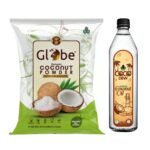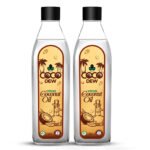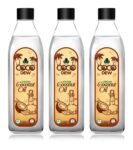Introduction to Virgin Coconut Oil
Virgin coconut oil (VCO) is a natural oil derived from the freshly harvested meat of coconuts. This unrefined oil is extracted through a process that involves minimal processing, ensuring that the oil retains its nutritional and beneficial properties. Unlike regular coconut oil, which is often refined and may undergo bleaching or deodorizing processes, virgin coconut oil is cold-pressed or expeller-pressed, preserving the essential compounds inherent in the coconut. This distinction is significant as it affects the oil’s flavour, aroma, and health benefits.
The origins of virgin coconut oil can be traced back to countries with a tropical climate, primarily in Southeast Asia and the Pacific Islands, where coconut palms thrive. It has been an integral part of the local culture, used for both dietary and medicinal purposes for generations. In recent years, however, virgin coconut oil has garnered increasing attention worldwide, particularly within health and beauty communities. This surge in popularity is attributed to its unique properties, which include a high content of medium-chain fatty acids (MCFAs), specifically lauric acid, known for its antimicrobial and anti-inflammatory effects.
The natural composition of virgin coconut oil has positioned it as a versatile product suitable for a variety of applications. From cooking to skincare and haircare, its uses extend far beyond simple culinary purposes. Users have reported significant benefits, including improved skin hydration, enhanced hair health, and support for overall well-being. As research continues to unveil its numerous advantages, virgin coconut oil is poised to remain a favored choice among those seeking to incorporate natural, effective products into their daily routines.
Nutritional Profile of Virgin Coconut Oil
Virgin coconut oil is celebrated not only for its culinary uses but also for its remarkable nutritional components that contribute significantly to various health benefits. At the core of its nutritional profile are medium-chain fatty acids (MCFAs), which are a type of saturated fat that the body metabolizes differently than long-chain fatty acids found in many other oils. The most prominent of these MCFAs is lauric acid, which constitutes up to 50% of the oil’s content. Lauric acid has garnered attention for its antimicrobial and antifungal properties, making it effective against various pathogens and potentially beneficial for immune health.
In addition to lauric acid, virgin coconut oil contains other beneficial MCFAs, including caprylic acid and capric acid. These fatty acids are known for their ability to boost energy levels and support metabolism, serving as a quick source of fuel for the body. This unique combination of fatty acids not only enhances the nutritional value of virgin coconut oil but also improves its effectiveness in skincare and hair care regimes. The high fat content, while predominantly saturated, contributes to the moisturizing properties of the oil. When applied to the skin, virgin coconut oil forms a protective barrier, locking in moisture and preventing dryness.
Furthermore, virgin coconut oil is rich in antioxidants, which play a pivotal role in combating oxidative stress and potentially reducing the risk of chronic diseases. This antioxidant capacity can enhance the oil’s suitability for hair care by promoting scalp health and reducing hair damage caused by free radicals. Adopting virgin coconut oil within one’s routine can thus yield multifaceted benefits, owing to its rich nutritional profile that not only supports overall health but also offers effective solutions for skin and hair care.
Benefits of Virgin Coconut Oil for Skin
Virgin coconut oil has gained recognition in the realm of skincare due to its multifaceted benefits. Its superior moisturizing properties make it an exceptional choice for individuals with dry and sensitive skin types. The oil penetrates deeply into the epidermis, helping to retain moisture and preventing transepidermal water loss. This is invaluable for maintaining skin hydration, especially in harsh climates or during winter months when skin tends to become parched.
Moreover, virgin coconut oil possesses potent antibacterial properties. It contains lauric acid, which has been shown to exhibit antimicrobial effects against a variety of pathogens. This characteristic can aid in combating acne-causing bacteria, making it not only beneficial for those with acne-prone skin but also for individuals who are concerned about breakouts. Regular application can help in keeping the skin clear and balanced.
In addition to its antibacterial effects, coconut oil also exhibits anti-inflammatory properties that can soothe irritated and inflamed skin. This makes it a suitable option for individuals with conditions such as eczema, psoriasis, or general skin irritations. By reducing inflammation, virgin coconut oil can promote healing and alleviate discomfort associated with these skin issues.
Practical applications of virgin coconut oil in skincare are plentiful. It can be used as a moisturizer, providing an effective barrier that locks in moisture. Additionally, it serves as an excellent makeup remover, dissolving makeup products without irritating the skin. Its pleasant scent and non-greasy feel make it a popular choice among users. Furthermore, incorporating virgin coconut oil into one’s skincare routine can offer benefits beyond hydration, helping to fight bacteria and reduce inflammation, ultimately leading to healthier skin.
The Role of Virgin Coconut Oil in Hair Care
Virgin coconut oil, renowned for its myriad benefits, plays a transformative role in hair care. Its unique composition allows it to penetrate the hair shaft effectively, providing nourishment that is critical for maintaining healthy hair. Unlike many other oils, virgin coconut oil is rich in medium-chain fatty acids, particularly lauric acid, which lends itself to better absorption into the hair. This penetrating ability significantly aids in reducing protein loss, a common issue that leads to weak and damaged hair.
Protein loss can occur due to various external factors, including heat styling and chemical treatments, making the use of virgin coconut oil an essential part of a hair care routine. Regular application can help to fortify the hair, enhancing its resilience against breakage while promoting overall strength. Furthermore, the oil adds a natural sheen, helping to enhance the hair’s luster and giving it a vibrant, healthy appearance. This characteristic makes it a popular choice for those seeking to maintain the shine and integrity of their hair.
To reap the benefits of virgin coconut oil for deep conditioning, one effective method is to warm a small amount of oil and apply it from the roots to the tips of the hair. This can be left on for at least 30 minutes or even overnight for maximum impact before washing it out with a mild shampoo. Additionally, for frizz control, a few drops of virgin coconut oil can be rubbed between the palms and smoothed over dry hair to tame unruly strands. For scalp health, a gentle massage with the oil can stimulate blood circulation and combat dryness, contributing to a healthier scalp environment.
Incorporating virgin coconut oil into your hair care regimen can yield significant improvements, showcasing the powerful benefits it holds for both hair health and beauty.
Health Benefits of Virgin Coconut Oil
Virgin coconut oil has garnered attention not just in beauty and personal care but also in the realm of health and nutrition. One of the most notable benefits associated with this oil is its ability to boost metabolism. The medium-chain triglycerides (MCTs) present in virgin coconut oil are metabolized differently than long-chain fatty acids. They are quickly converted into ketones, providing an efficient energy source that can elevate metabolic rates and promote fat burning, making it an excellent addition for those looking to manage their weight.
Aiding in weight loss is another benefit attributed to virgin coconut oil. Research indicates that incorporating MCTs into one’s diet can suppress appetite, leading to reduced calorie intake. Additionally, these fats can enhance thermal genesis, contributing further to weight loss efforts. Essentially, the strategic use of virgin coconut oil may play a pivotal role for individuals aiming to achieve their weight loss goals while still ensuring their body receives essential nutrients.
Furthermore, recent studies suggest that virgin coconut oil supports brain health. The presence of MCTs promotes the production of ketones, which serve not only as energy sources but also exhibit neuroprotective properties. Such benefits have sparked interest in the oil’s potential use in managing conditions like Alzheimer’s disease and other neurodegenerative disorders, highlighting promising avenues for further research.
Lastly, virgin coconut oil is known to bolster immune function. Its antimicrobial properties, largely due to lauric acid, can help fight infections and inflammation. This immune support is particularly relevant in today’s environment, where maintaining optimal health has garnered renewed importance. Overall, the multifaceted health benefits of virgin coconut oil present a compelling case for its integration into a balanced diet and wellness regimen.
How to Incorporate Virgin Coconut Oil into Your Routine
Virgin coconut oil is a versatile and beneficial product that can seamlessly fit into various aspects of daily life. One of the most common ways to incorporate coconut oil is through culinary uses. It serves as an excellent alternative to conventional cooking oils, given its high smoke point and rich flavor. Substitute virgin coconut oil for butter or other oils in baking, sautéing, or even frying. Additionally, it can be used as a base for salad dressings or smoothies, enriching their nutritional profile while imparting a delightful aroma.
Moving beyond the kitchen, virgin coconut oil can significantly enhance beauty routines. As a moisturizer, it provides deep hydration for the skin, making it ideal for those with dry or sensitive skin. Applying a small amount to the face or body after washing can help lock in moisture. Furthermore, it can be used as an effective makeup remover; simply massage the oil onto the skin to dissolve makeup, followed by a gentle rinse with warm water. For a luxurious treatment, consider mixing virgin coconut oil with essential oils to create a soothing body oil or massage lotion.
DIY recipes for hair and skin treatments also highlight the versatility of virgin coconut oil. For hair, consider making a nourishing hair mask by combining it with honey and avocado. Apply this mixture to damp hair, leave it on for 30 minutes, and then wash as usual to reveal softer, shinier strands. For skin treatments, a simple sugar scrub can be made by mixing coconut oil with sugar and lemon juice, providing an exfoliating yet moisturizing effect. These quick and easy DIY recipes showcase how effortlessly virgin coconut oil can be integrated into existing beauty and self-care routines.
Precautions and Considerations
While virgin coconut oil is celebrated for its numerous benefits for skin, hair, and health, it is essential to exercise caution and consider certain factors before integrating it into your routine. One primary concern is its comedogenicity, which refers to its potential to clog pores. For individuals with oily or acne-prone skin, virgin coconut oil may exacerbate these conditions, leading to breakouts. It is advisable for such skin types to perform a patch test on a small area prior to full application to ascertain tolerance and prevent adverse reactions.
Another critical aspect is the quality of the virgin coconut oil being used. Not all coconut oils are created equal; some may undergo extensive refining processes that strip away beneficial nutrients. Therefore, selecting high-quality, cold-pressed virgin coconut oil is paramount. This ensures that you receive the full spectrum of its vitamins, antioxidants, and anti-inflammatory properties. Always look for products labeled as organic and free from additives or synthetic ingredients.
When considering dietary incorporation, individual nutritional needs must also be assessed. Virgin coconut oil is calorie-dense, and while it provides several health benefits, moderation is key. People with specific dietary restrictions, like those on a low-fat diet or those with a history of hyperlipidemia, should consult a healthcare professional before integrating significant quantities into their meals. Additionally, it’s prudent for individuals with known allergies to coconut products to avoid using virgin coconut oil altogether.
Ultimately, while virgin coconut oil can be a valuable addition to skin and hair care, as well as a dietary component, awareness of its potential drawbacks and individual reactions is essential to maximize its benefits safely.
Comparing Virgin Coconut Oil with Other Oils
In the realm of natural oil options, virgin coconut oil is often highlighted for its myriad benefits, particularly in comparison to other widely used oils such as olive oil, argan oil, and almond oil. Each of these oils possesses unique properties that cater to specific needs, but virgin coconut oil often stands out in several key aspects.
First and foremost, virgin coconut oil is renowned for its high levels of medium-chain fatty acids, specifically lauric acid, which is known for its antimicrobial properties. This sets it apart from olive oil, which is rich in monounsaturated fats and antioxidants. While olive oil is prized for its heart health benefits and is frequently used in cooking, virgin coconut oil can be a superior choice for skin health and hair conditioning, often used in topical applications to enhance moisture and provide a protective barrier.
Argan oil, derived from the nuts of the argan tree, has become popular for its moisturizing benefits and is celebrated for its ability to nourish and smooth hair follicles. However, it does not possess the same antimicrobial qualities as virgin coconut oil. The versatility of virgin coconut oil allows it to be used not only in cosmetics but also as a dietary supplement. This dual functionality may make virgin coconut oil more appealing to those seeking a multi-purpose oil.
Another noteworthy comparison is with almond oil, which is often used in skin creams and hair treatments for its lightweight texture and nourishing effects. While almond oil does provide hydration, virgin coconut oil’s unique composition makes it an excellent remedy for skin issues such as eczema, and it is also reputed to stimulate hair growth. When weighing the options, those seeking both internal and external health benefits may find virgin coconut oil to be the preferred choice, particularly for individuals who appreciate natural remedies.
Conclusion
Virgin coconut oil has emerged as a remarkable natural product, offering an array of benefits for skin, hair, and overall health. Its significance in personal care routines stems from its rich composition of medium-chain fatty acids, particularly lauric acid, which serves not only as a moisturizer but also as an antimicrobial agent. When utilized in skincare, virgin coconut oil effectively hydrates, nourishes, and helps to protect the skin barrier, making it an excellent choice for those seeking a radiant complexion. Additionally, its anti-inflammatory properties can assist in soothing various skin irritations and conditions.
For hair, virgin coconut oil acts as a potent conditioner, promoting healthy growth and combating hair damage. Its ability to penetrate the hair shaft enhances moisture retention and reduces protein loss, resulting in stronger, shinier hair. Furthermore, it can serve as a protective barrier against environmental factors, allowing individuals to maintain their hair’s health even in challenging conditions.
On a broader health spectrum, the consumption of virgin coconut oil is associated with numerous benefits, including improved digestion, boosted immunity, and enhanced cognitive function. Its versatility extends beyond the realm of beauty, establishing it as a valuable dietary supplement for those striving for a healthier lifestyle.
Considering the multitude of benefits and its natural origins, embracing virgin coconut oil can significantly enhance your daily health and beauty regimen. It is increasingly essential to integrate this remarkable product into your routines, whether through topical application or consumption. We encourage you to explore its versatility in various usages and share your experiences with the community. Your insights may inspire others to unlock the potential of virgin coconut oil for their own well-being.





